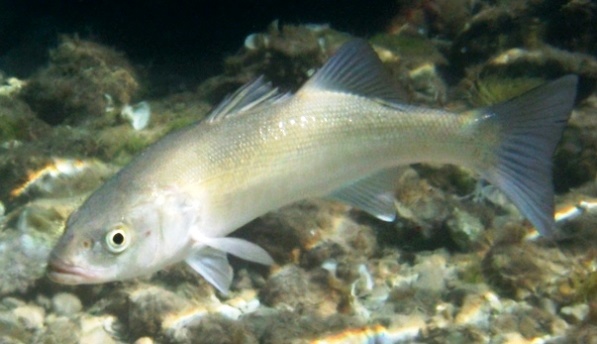Humans' contributions to global warming through burning fossil fuels and other actions (for example, detrimental land-use practices) have resulted in sharp increases in the levels of atmospheric carbon dioxide (CO2). These rising levels of CO2 also affect the world's oceans. When CO2 from the atmosphere is absorbed by and dissolved in seawater, it acidifies the water by forming carbonic acid. This process then decreases the pH of the water, potentially endangering numerous marine ecosystems. Now, a study investigating the effects of elevated CO2 levels on the olfaction of the European bass (Dicentrarchus labrax, order Perciformes) has indicated a dramatic result—namely, the loss of the fish's sense of smell. Researchers are troubled by this outcome and are fearful that the survival of many marine fish species may be at risk because of compromised olfactory mechanisms. See also: Basses; Biogeochemistry; Carbon dioxide; Ecosystem; Global climate change; Global warming; Marine ecology; Ocean acidification; Olfaction; Perciformes; pH; Seawater

The sense of smell serves many purposes in fish. Through the detection of odors, fish utilize their sense of smell to accomplish many daily activities, including navigating, locating food, recognizing members of the same species, finding safe habitats (especially habitats in which to live and spawn), and avoiding predators. Hence, the fish could suffer grave consequences if their ability to smell were reduced or blocked. See also: Animal navigation; Chemical senses; Predator-prey interactions; Sense organ
Furthermore, bass that were exposed to high levels of CO2 (specifically, levels that are predicted to occur by the end of the twenty-first century) showed drastic alterations in their behavior as a result of sensory cues that have been inhibited. For example, bass that are swimming in seawater that is more acidic than current conditions have been observed to swim less frequently and to be less prone to detect the smell of a predator. These fish also show behaviors more indicative of anxiety (such as "freezing" responses) rather than behaviors that enable escape (flight). Remarkably, the sense of smell was determined to be cut in half by the elevated CO2 levels, and the fish needed to be more than 40% closer to an odor source to detect it. Scientists hypothesize that the acidified seawater impedes the binding of odorant molecules to olfactory receptors in the noses of the fish, making it more difficult for the fish to interpret these sensory stimuli. In addition, the expression of genes responsible for the processing of the olfactory information within the fish's brain was observed to be altered. See also: Chemoreception; Gene; Molecular shape and the sense of smell; Nose; Physiological ecology (animal)





